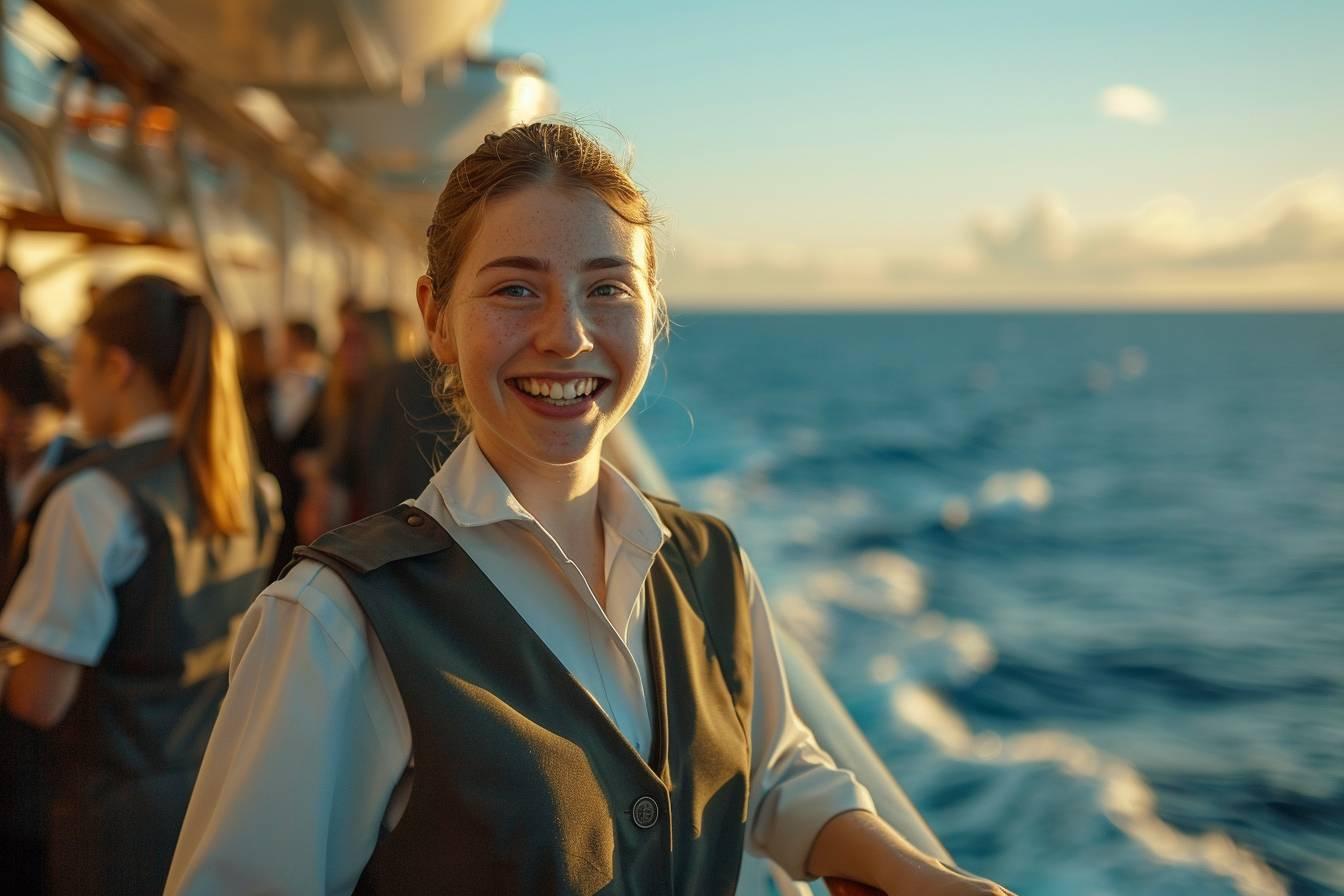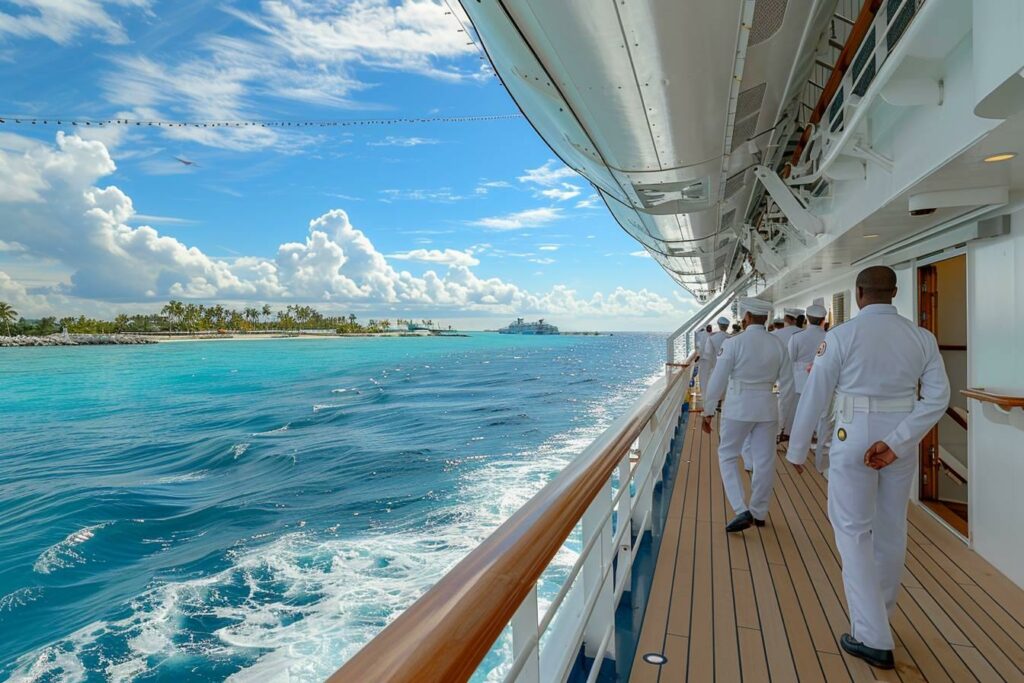Embarking on a career on the high seas offers a unique professional experience. Working on a cruise combines the allure of travel with varied employment opportunities. This guide explores the different aspects of this professional adventure, from the positions available and the qualifications required, to the benefits and challenges of life on board.
Jobs available on cruise ships
Luxury liners are veritable floating cities, requiring a large and diverse workforce. Job opportunities on board cover a wide range of fields, from hospitality to engineering to entertainment. Here’s an overview of the main sectors recruiting on cruise ships:
Hospitality and catering: This sector accounts for the largest number of positions. It includes cabin stewards, waiters, bartenders, cooks and pastry chefs. These professionals ensure passenger comfort and satisfaction on a daily basis.
Entertainment and leisure: Animators, entertainers, fitness instructors and croupiers fall into this category. Their job is to entertain passengers and create a festive atmosphere on board.
Passenger services: This area includes receptionists, tour guides, photographers and store assistants. Their role is to assist passengers and enhance their cruise experience.
Technical crew: Engineers, electricians and deck officers are essential to the smooth running of the ship. They are responsible for the ship’s safety and navigation.
Health and well-being: Doctors, nurses, masseurs and beauticians fall into this category, offering care and wellness services to passengers.
- Cabin steward
- Chef
- Host
- Navigation officer
- Spa manager
Each position requires specific skills and offers different career prospects. The diversity of jobs available means that many professionals can find their place in the luxury cruise industry.
Qualifications and skills required
To land a job on a cruise ship, certain qualifications and skills are essential. Requirements vary according to the position sought, but a few criteria are common to most jobs on board:
Language skills: The ability to communicate in English is essential. Knowledge of other languages, such as German, Spanish or French, is a considerable asset when interacting with an international clientele.
Adaptability and flexibility: Life at sea means adapting to a constantly changing environment. Employees must be prepared to work irregular hours and deal with unforeseen situations.
Experience in the service sector: For many positions, previous experience in the hotel, restaurant or tourism industry is an advantage. It validates an understanding of the expectations of a demanding clientele.
Specific training: Some jobs require special certification. For example, deck officers must hold marine certificates, while medical staff must be qualified and accredited.
| Position | Qualifications required | Key skills |
|---|---|---|
| Chef | Diploma in cooking, experience in catering | Creativity, team management |
| Animator | Animation training, artistic talent | Stage presence, sociability |
| Navigation officer | Maritime certificate, navigation training | Leadership, decision-making skills |
Cruise lines are also looking for candidates with excellent interpersonal skills. The ability to work as part of a team, manage stress and maintain a positive attitude are essential qualities for success in this unique environment.

Benefits and challenges of life at sea
Working on a cruise liner offers a unique professional experience, with significant benefits as well as particular challenges. Understanding these aspects is essential for anyone considering a career in the cruise industry.
Benefits :
- Travel and discovery: The opportunity to visit many exotic countries and ports is a major attraction.
- Potential savings: With accommodation and food provided, employees can save a large part of their salary.
- Multicultural experience: Working with colleagues from all over the world encourages open-mindedness and intercultural learning.
- Professional development: There are many opportunities for rapid advancement and the acquisition of a wide range of skills.
Challenges:
Life at sea also has its more challenging aspects. Long periods away from family and friends can be trying. Work contracts, often for 6 to 9 months at a time, demand great physical and mental stamina. Limited personal space and the intense pace of work are other realities to consider.
Captain Paolo Rossi, a cruise industry veteran, points out: “Life on board requires a great deal of adaptability. It’s a unique way of life that offers extraordinary experiences, but also requires personal sacrifice.”
Employees must also adapt to the strict rules of life at sea. Safety is paramount, and all crew members must participate in regular emergency drills. In addition, the hierarchy on board is highly structured, which can be a challenge for those used to more flexible working environments.
Despite these challenges, many professionals find that the benefits far outweigh them. The opportunity to travel while working, combined with the unique experience of life at sea, attracts thousands of applicants to the cruise industry every year.
Outlook and industry trends
The cruise industry is growing steadily, offering promising prospects for those who choose it as a career. Current industry trends are shaping the future of jobs at sea and creating new opportunities.
Career development :
There are many opportunities for advancement in the cruise industry. An entry-level waiter, for example, can rise through the ranks to become a maître d’hôtel or even a catering manager. Similarly, a talented entertainer can progress to the position of entertainment director. The key to success lies in performance, versatility and a willingness to learn.
Trends influencing the sector :
- Technology: The increasing integration of technology on board is creating a demand for IT and data management skills.
- Sustainability: Cruise lines are emphasizing green practices, opening up positions related to environmental management.
- Personalized experiences: Growing demand for customized services is increasing the need for skilled personnel in the customer experience field.
The International Maritime Organization (IMO) forecasts a 30% increase in demand for skilled personnel in the cruise industry by 2030. With this growth comes an evolution in the skills required, with a particular emphasis on versatility and adaptability.
Modern cruise ships like Royal Caribbean’s Symphony of the Seas illustrate these trends. With its 6,680 passengers and 2,200 crew members, this giant of the seas requires a wide range of professionals, from robotics experts for its automated bars to specialists in sustainable development.
To remain competitive, industry professionals must continually update their skills. Ongoing training and certification in specialized fields are becoming increasingly important. Cruise lines invest in internal development programs, offering growth opportunities to their most promising employees.
In conclusion, working on a cruise offers not only a unique experience, but also diverse and evolving career opportunities. Whether for a short-term adventure or to build a long-term career, the world of cruising continues to attract those who dream of combining work and travel in a dynamic, multicultural environment.

